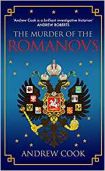The Murder of the Romanovs by Andrew Cook
The fate of Tsar Nicholas II of Russia, his wife Alexandra and children, fuelled no end of rumour, misinformation and conspiracy theories for many years, even though the truth was known not long after the event. In the last few years, the advance of forensic science, DNA testing and the precise location of the bodies have allowed for confirmation of the exact truth and a dismissal of claims by a noted so-called surviving Grand Duchess. Even so, as Andrew Cook notes, straight after the deaths of the imperial family 'there would begin a ninety-year battle between science and superstition which is not over yet'.
| The Murder of the Romanovs by Andrew Cook | |
|
| |
| Category: History | |
| Reviewer: John Van der Kiste | |
| Summary: The fate of Tsar Nicholas II of Russia, his wife Alexandra and children, fuelled no end of rumour, misinformation and conspiracy theories for many years, even though the truth was known not long after the event. Recent scientific advances have allowed for confirmation of the exact truth and a dismissal of claims by a noted impostor. Cook's account, one of many recently published, may not offer anything which has not already been published in other titles, but he tells the story well for the general reader. | |
| Buy? Yes | Borrow? Yes |
| Pages: 256 | Date: March 2017 |
| Publisher: Amberley | |
| ISBN: 978-1445666273 | |
|
| |
His account begins with the appearance of Anna Anderson, Fraülein Unbekannt, or 'Miss Unknown', the woman who tried to drown herself in the river in Berlin one dark night in February 1920. Claiming to be Grand Duchess Anastasia, who had miraculously survived the massacre of the rest of her family, for the rest of her life she had her supporters, although royal and imperial relatives denounced her as an imposter. The following chapters deal with Tsar Nicholas and his remarkable similarity to his cousin and close friend King George V of Britain, both being the sons of very similar-looking sisters. Both men had a certain amount in common apart from looks, although it was George's good fortune to be at the head of a constitutional monarchy and Nicholas's tragedy to be an autocrat at the head of a vast, crumbling empire, a role for which he was ill-prepared and by personality quite unfitted. Whether George would have fared better in his shoes who can say, but the point is established that he had more personality and leadership qualities than his younger cousin.
It is also noticeable that Cook is very critical throughout of the Tsar and Tsarina, portraying the former as a spineless vacillating creature whom nearly everybody liked and pitied at the same time, and the latter as an arrogant obsessive consort who refused to believe she might be wrong and was the ultimate if inadvertent architect of their downfall. Such a verdict may be inescapable if harsh, but it contrasts with a much more sympathetic appraisal by the first of their modern biographers, Robert K. Massie, whose study has been for many readers their introduction to the period. Massie, who was drawn to write about them as his son was a haemophiliac like the Tsarevich, portrayed them as victims of forces beyond their control. Cook's verdict makes fewer allowances, and in particular has scarcely a good word to say about the Tsarina.
Although he might be short on empathy, one cannot fault his narrative. He takes us crisply through the state of Russia during its last twenty years, the course of the First World War, and the revolution. While the truth emerged quite recently, ample evidence is supplied of King George's withdrawal of asylum to his dethroned cousin and family in England in 1917, whereas his radical Prime Minister Lloyd George was for years thought to be responsible. I think though that insufficient consideration is given to the role of Queen Mary, who was widely believed for firming up her husband's resolve when he was in two minds about whether to grant 'Nicky and Alicky' asylum, on the grounds that to give hospitality to a group of relatives so reviled an increasingly war-weary and left-leaning population would threaten the British crown.
The thread continues through the Romanovs' imprisonment in increasingly oppressive and squalid circumstances, unsuccessful rescue attempts and escape plans, the night of the massacre, and initial rumours that only the Tsar was killed while the rest were moved to a place of safety. Reports, investigations, exhumation of the bodies and scientific testing have established what nearly everybody knew all along, despite a small margin for doubt that the worst may not have really happened.
There have been many books in recent years about the last chapter of the doomed dynasty, all of which have been well placed to take advantage of modern research. Cook may not offer anything which has not already been published in other titles, but he has given us a relatively compact book free from scientific jargon which tells the story well for the general reader. His style is light and informal, and notwithstanding a light personal bias against the two leading protagonists as referred to above, I can recommend this as a good introductory volume to the subject.
For further reading, may be also suggest a detailed account of the 1918 murders, Ekaterinburg: The Last Days of the Romanovs and a biography of the Grand Duchesses themselves, Four Sisters: The Lost Lives of the Romanov Grand Duchesses, both by Helen Rappaport, one of the acknowledged Romanov experts. 25 Chapters of My Life: The Memoirs of Grand Duchess Olga Alexandrovna by Olga Alexandrovna, Paul Kulikovsky, Sue Woolmans and Karen Roth-Nicholls is an interesting study of the Tsar's sister, one of those who survived the revolution, and for those who would like a fictional account, The House of Special Purpose by John Boyne is also worth reading.
Please share on: ![]() Facebook,
Facebook, ![]() Twitter and
Twitter and
![]() Instagram
Instagram
![]() You can read more book reviews or buy The Murder of the Romanovs by Andrew Cook at Amazon.co.uk Amazon currently charges £2.99 for standard delivery for orders under £20, over which delivery is free.
You can read more book reviews or buy The Murder of the Romanovs by Andrew Cook at Amazon.co.uk Amazon currently charges £2.99 for standard delivery for orders under £20, over which delivery is free.
![]() You can read more book reviews or buy The Murder of the Romanovs by Andrew Cook at Amazon.com.
You can read more book reviews or buy The Murder of the Romanovs by Andrew Cook at Amazon.com.
Comments
Like to comment on this review?
Just send us an email and we'll put the best up on the site.

